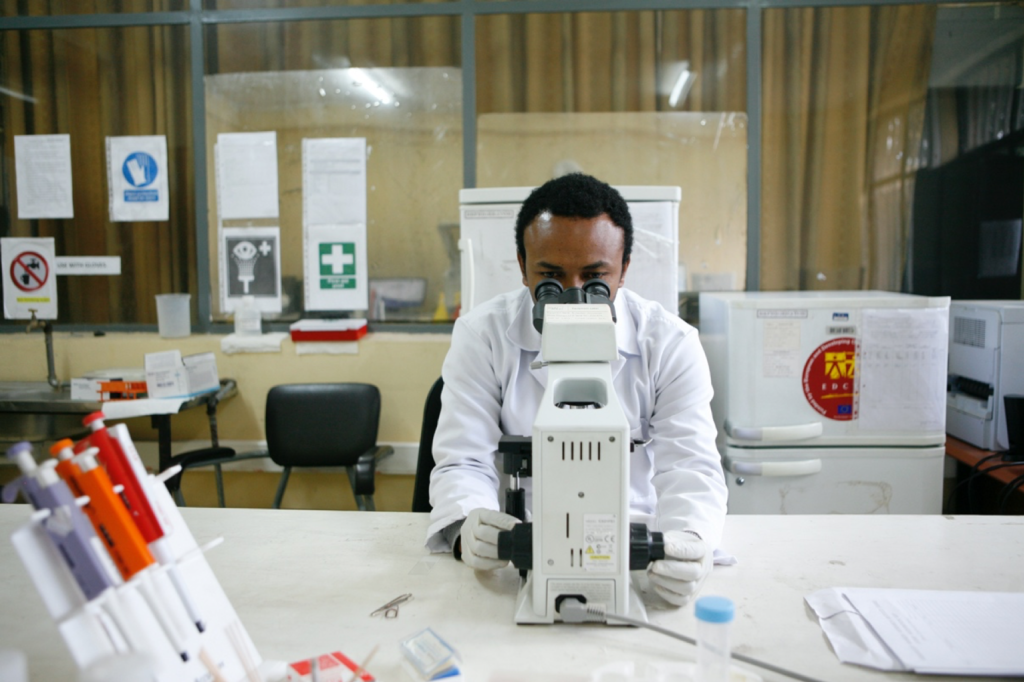Vital Strategies’ Research work generates high-quality evidence to guide important public health decisions. However, knowledge generation is not enough; we build the institutions required to ensure the impact of our research is sustained over the long-term. To that end, we invest in training the researchers of tomorrow; provide technical assistance to overcome key roadblocks to increasing research capacity in low- and middle-income countries; and equip affected communities to understand and participate in the research we conduct.
Vital Strategies successfully completed implementation of the USAID-funded TREAT TB project, aimed at supporting research to optimize the effectiveness of existing technologies and approaches for TB diagnosis and treatment, while supporting late-stage clinical trials, field evaluations and operational research to bring new tools and approaches to the fore.

Capabilities
Clinical Trial
Vital Strategies implemented the STREAM clinical trial between 2012 and 2022. STREAM is the world’s largest recruited, multi-country clinical trial to examine shortened regimens for MDR-TB. It is also the first phase III clinical trial to test the efficacy and safety of bedaquiline, one of the newest TB drugs, within a shortened treatment regimen.
Community Engagement
Vital Strategies has supported community engagement activities at all STREAM clinical trial sites to ensure that community stakeholders are equipped to collaborate on the trial and in future research, and are consulted throughout the research cycle. STREAM community advisory boards provide a crucial link between the community and the research team.
Operational Research
Operational research (OR) plays a key role in generating the evidence needed to guide policies and programs. Vital Strategies , under the TREAT TB project, has conducted in-person and virtual OR training courses for health professionals in high-TB burden countries and produced several free online educational resources related to the topic.
Technical Assistance
Vital Strategies has provided technical assistance (TA) to national tuberculosis programs (NTPs) under the TREAT TB project. In the Philippines, between 2016 and 2019, Vital Strategies provided a comprehensive package of TA to the NTP to support national scale-up of the standard short treatment regimen (SSTR) for MDR-TB. The partnership with the Philippines NTP was instrumental for the country’s scale-up of the SSTR, and strengthening the NTP’s supervision, monitoring and evaluation system. The project aimed to link international best practices and research results into practice for new treatment regimens.
Vital Strategies provided onsite technical assistance and worked with the NTP at the national, regional, and provincial/city level to identify tailored solutions to barriers and challenges with scale up of the SSTR. We provided supportive supervision, and mentorship on the clinical management of MDR-TB for approximately 125 healthcare workers at more than 25 health facilities. In addition, six workshops were conducted with key stakeholders from the national and subnational levels to identify targeted solutions for challenges associated with the scale-up of the SSTR. More than 300 nurses were trained on the SSTR and management of common adverse drug reactions associated with MDR-TB treatment. By the end of 2017, the SSTR was rolled out nationwide, and by the end of 2018, 80% of patients enrolled in treatment were treated with the SSTR.
Capacity Building
Strengthening the capacity of key stakeholders to conduct clinical trials has remained a key focus during STREAM trial implementation. Vital Strategies and its partners supported specialized training for STREAM clinicians, laboratory scientists, pharmacists and community advisory board members covering topics ranging from ICH Good Clinical Practice guidelines, to microbiological testing methods (LPA, FDA vital staining, etc.), to the ethics of community engagement and Good Participatory Practices for TB trials. Vital Strategies has also built capacity for independently conducting operational research and systematic reviews, and has trained more than 170 health professionals in high TB burden countries since 2008. The webinars, symposia and other public training events conducted as part of the TREAT TB project reached a broad audience globally.
Resources
- Community Engagement Lessons Learned: A Community Perspective
- STREAM Community Engagement Logic Model
- Evaluation of two short standardized regimens for the treatment of rifampicin-resistant tuberculosis (STREAM stage 2): an open-label, multicenter, randomized, non-inferiority trial
- Practical recommendations from the STREAM clinical trial
- Challenges in Tuberculosis Clinical Trials in the Face of the COVID-19 Pandemic: A Sponsor’s Perspective
- A Trial of a Shorter Regimen for Rifampin-Resistant Tuberculosis
- TREAT TB E-Tools
- Good Clinical Practice For Pharmacists
- An Introduction to Community Engagement
- Implementation challenges and lessons learned from the STREAM clinical trial—a survey of trial sites